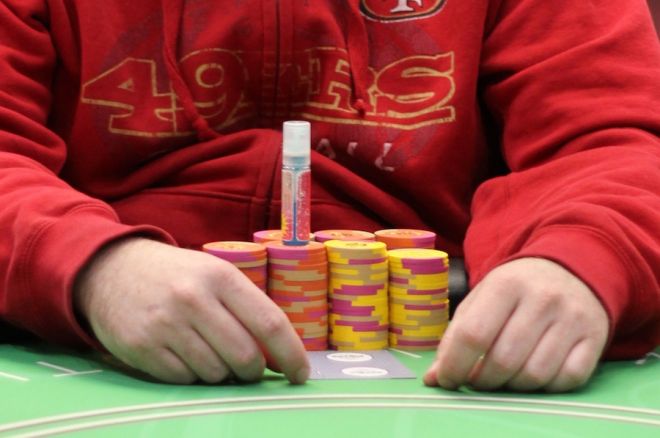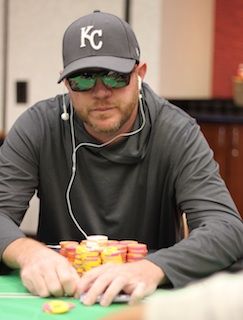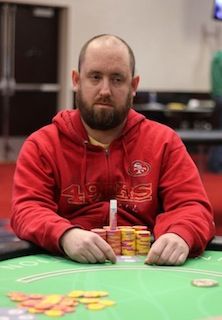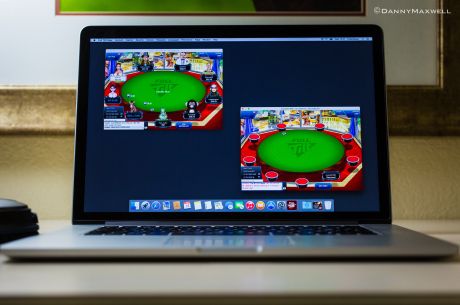There��s No Rush: Get the Count When Someone Shoves on You

Covering live poker tournaments for a living affords me the opportunity to see countless thousands of hands played out, many of which offer interesting and potentially valuable insights into how players �� both amateurs and professionals �� play the game. In this ongoing series, I��ll highlight hands I��ve seen at the tournaments I��ve covered and see if we can glean anything useful from them.
The Scene
Last week, we looked at a hand played by your intrepid author in a RunGood Poker Series preliminary event. This week, we��re still on the RunGood tour, but it��s the big boy tournament �� the $675 Main Event at RunGood Poker Series Hard Rock Tulsa.

The tournament drew 281 players but has been whittled down to just six, with the top spot paying out $33,998 while the next eliminated player gets $5,912. The blinds have recently moved to Level 23 (15,000/30,000/5,000) and Justin Custer is the lone player below the 20-big blind threshold. He��s been short-stacked for a while, but well-timed shoves that haven��t been called have kept him afloat.
The Action
Chip leader Troy Repp, sitting with a stack of around 1.5 million, opens for 75,000 in the cutoff. Action folds to Custer in the big blind who has 375,000 total including the blind he has just posted. As he has done every time he has entered a pot for the last couple of hours, Custer shoves all in. Repp quickly calls, but he soon sees really bad news:
Custer: A?A?
Repp: A?8?
Custer has a seeming hammerlock on a double-up, but Repp flops an unlikely flush draw as the first three cards come Q?9?7?. He then runs a straight as the 6? turn is followed by a 5? river, eliminating Custer in devastating fashion.
After the hand, Repp sheepishly admitted he thought Custer was considerably shorter than he was and may not have made the call had he realized Custer had 375,000.
Concept and Analysis
There��s a saying in football that��s supposed to serve as a mantra for players who find themselves on the dangerous, hard-hitting job of covering kickoffs �� ��head on a swivel.�� If you aren��t constantly paying attention to your surroundings, you��re liable to get your clock cleaned by something you didn��t see coming.

Tournament poker can be much the same way, especially during the latter stages. Because stacks are so short in general, one or two pots here and there can considerably change a player��s stack and therefore his or her tournament situation. A couple of lost or won pots can turn a player who is shoving or folding into a player who can raise and then fold to an opponent��s shove and vice-versa.
Repp��s snap-call with A?8? was strange on the surface, but makes sense when you factor in that he mentioned after the hand he thought Custer was much shorter than he was.
Repp would go on to clarify he thought Custer had around 250,000, not 375,000. In that case, facing a shove of about eight big blinds, calling would be fairly automatic after a 2.5x opening raise �� the pot odds are great, plus Custer should be desperate to double and therefore doesn��t have to have a premium hand. Had Repp actually known he was facing a shove of more than 12 big blinds, he would have at the very least had a tough decision.
This hand illustrates exactly how tight decisions can be late in tournaments. A few big blinds here and there might seem minor, but they can make a world of difference when making a decision. It��s absolutely essential to know exactly how many chips a player has when he or she shoves.
The upshot is that live poker is a slow-moving beast. You don��t have a time bank quickly ticking down on you like online. Especially following a shove, it��s expected that a player will take some time to consider the situation before acting.
If you aren��t 100 percent certain what the amount of a bet is, simply ask the dealer to count it. Repp should have done so, and by skipping that step ended up in a bad spot as a result. I have to admit I��ve made the same mistake myself and you really end up kicking yourself afterward because it��s just so unnecessary.
As luck would have it, Repp was able to pull off the unlikely and crack the aces. He eliminated Custer in sixth and went on to win the tournament, banking nearly $34,000 in the process.
Want to stay atop all the latest in the poker world? If so, make sure to get PokerNews updates on your social media outlets. Follow us on Twitter and find us on both Facebook and Google+!









